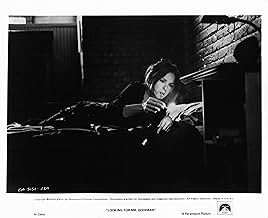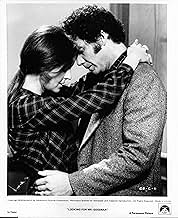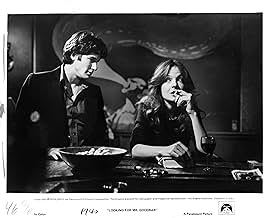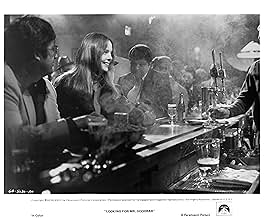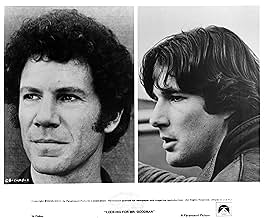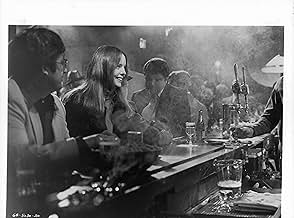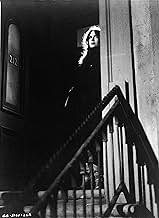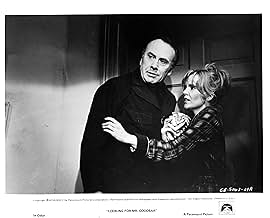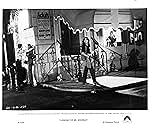Une institutrice dévouée passe ses nuits dans les bars, à la recherche d'hommes violents avec lesquels elle aura des relations sexuelles de plus en plus brutales.Une institutrice dévouée passe ses nuits dans les bars, à la recherche d'hommes violents avec lesquels elle aura des relations sexuelles de plus en plus brutales.Une institutrice dévouée passe ses nuits dans les bars, à la recherche d'hommes violents avec lesquels elle aura des relations sexuelles de plus en plus brutales.
- Nommé pour 2 Oscars
- 1 victoire et 6 nominations au total
Histoire
Le saviez-vous
- AnecdotesTom Berenger admitted in an interview that he had nightmares after he was finished shooting all of his scenes as Gary.
- GaffesTheresa is supposed to be a first-grade teacher, but all her students look to be way older. The youngest seem to be 9 or 10 while the oldest could be 12, 13 or even older.
- Crédits fousThe Paramount logo is shortened at both ends, fading in at the point the text already appears. It was gray-scaled in the closing version.
- ConnexionsFeatured in Sex, Censorship and the Silver Screen: Forward Into the Past (1996)
- Bandes originalesTry Me, I Know We Can Make It
Written by Donna Summer (uncredited), Giorgio Moroder (uncredited) and Pete Bellotte (uncredited)
Performed by Donna Summer
Courtesy of Casablanca Record & FilmWorks
Commentaire à la une
Looking for Mr. Goodbar is directed by Richard Brooks and Brooks adapts the screenplay from the Judith Rossner novel of the same name. It stars Diane Keaton, Tuesday Weld, William Atherton, Richard Kiley, Richard Gere, Alan Feinstein and Tom Berenger. Music is by Artie Kane and cinematography by William A. Fraker.
Theresa Dunn (Keaton) is a dedicated schoolteacher to deaf children by day, but at night she cruises bars looking for abusive men with whom she can engage in progressively violent sexual encounters.
First off it should be noted that the Judith Rosner novel is based on the real life case of the 1973 murder of New York City schoolteacher Roseann Quinn. Also of note is that Rossner was not enamoured with this filmic adaptation.
What we have here is a tragic tale set in the promiscuous pre AIDS era of 1970s America. It's a bleak observation of the swinging singles scene of the era, providing caution of patriarch pressures, religious suffocation and the dangers of casual encounters for sexual gratification. Is it any wonder the big hitting critics of the time were nonplussed by it?...
The pic generated a lot of buzz for handsome new actor, Richard Gere, even if he does overact, it actually works in context to the brashness of the period. It also introduced Tom Berenger, in what is a frightening portrayal of a very sexually confused man. Tuesday Weld got a Best Supporting Actress Oscar nomination for playing Theresa's sister, which was richly deserved, so much so one wishes she was in the film more.
Yet it's Keaton who absolutely shines here, lifting an overlong picture to greater heights. Proving she had more in her armoury than merely playing kooks, Keaton imbues Theresa with a desperation and loneliness that is shattering for viewing purpose. The whole narrative bites with a crushing inevitability, that the nihilistic back drop can only bring pain and misery, and so it proves.
Richard Brooks should have sliced at lest thirty minutes from the run time, especially given that the "Theresa fantasy sequences" just come off as pointless and take one out of the heartbeat of the story. Yet this is still a fine movie, not one to be cheered up by of course, but poignant, relative and with the real life story at the core, important. 7/10
Theresa Dunn (Keaton) is a dedicated schoolteacher to deaf children by day, but at night she cruises bars looking for abusive men with whom she can engage in progressively violent sexual encounters.
First off it should be noted that the Judith Rosner novel is based on the real life case of the 1973 murder of New York City schoolteacher Roseann Quinn. Also of note is that Rossner was not enamoured with this filmic adaptation.
What we have here is a tragic tale set in the promiscuous pre AIDS era of 1970s America. It's a bleak observation of the swinging singles scene of the era, providing caution of patriarch pressures, religious suffocation and the dangers of casual encounters for sexual gratification. Is it any wonder the big hitting critics of the time were nonplussed by it?...
The pic generated a lot of buzz for handsome new actor, Richard Gere, even if he does overact, it actually works in context to the brashness of the period. It also introduced Tom Berenger, in what is a frightening portrayal of a very sexually confused man. Tuesday Weld got a Best Supporting Actress Oscar nomination for playing Theresa's sister, which was richly deserved, so much so one wishes she was in the film more.
Yet it's Keaton who absolutely shines here, lifting an overlong picture to greater heights. Proving she had more in her armoury than merely playing kooks, Keaton imbues Theresa with a desperation and loneliness that is shattering for viewing purpose. The whole narrative bites with a crushing inevitability, that the nihilistic back drop can only bring pain and misery, and so it proves.
Richard Brooks should have sliced at lest thirty minutes from the run time, especially given that the "Theresa fantasy sequences" just come off as pointless and take one out of the heartbeat of the story. Yet this is still a fine movie, not one to be cheered up by of course, but poignant, relative and with the real life story at the core, important. 7/10
- hitchcockthelegend
- 22 mai 2020
- Permalien
Meilleurs choix
Connectez-vous pour évaluer et suivre la liste de favoris afin de recevoir des recommandations personnalisées
Détails
Box-office
- Montant brut aux États-Unis et au Canada
- 22 512 655 $US
- Week-end de sortie aux États-Unis et au Canada
- 1 540 635 $US
- 23 oct. 1977
- Montant brut mondial
- 22 512 655 $US
- Durée2 heures 16 minutes
- Mixage
- Rapport de forme
- 1.85 : 1
Contribuer à cette page
Suggérer une modification ou ajouter du contenu manquant

Lacune principale
By what name was À la recherche de Mr. Goodbar (1977) officially released in India in English?
Répondre
